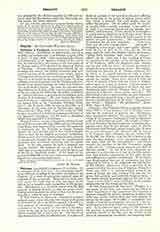

Peñalver y Cardenas, LUIS IGNATIUS, Bishop of New Orleans, Archbishop of Guatemala, son of a wealthy and noble family, b. at Havana, April 3, 1749; d. there, July 17, 1810. After studying belles-lettres and philosophy in St. Ignatius College of his native city, he followed there the courses of the University of St. Jerome and in 1771 obtained the degree of Doctor of Theology. Having distinguished himself by his learning and charity, his bishop entrusted him with several missions of an administrative nature, and in 1773 appointed him provisor and vicar-general. When Pius VI, in deference to the prayer of Carlos VI, King of Spain, created Louisiana and the Floridas a diocese, distinct from that of Santiago de Cuba, Luis Peñalver was made its first bishop. He made his entrance into New Orleans on July 17, 1795, took formal possession of his see, and in the following December published an “Instrucción para el govierno de los pàrrocos de la diócesis de la Luisiana”. He soon began the visitation of his diocese, which then extended over the country known later as the “Louisiana Purchase Territory”. On April 21, 1796, he was at Iberville, on November 8 of the same year at Natchitoches, and at Pensacola on May 7, 1798. Upon his return in 1799, he drew up a report in which he complained bitterly of the ignorance, irreligion, and the want of discipline which then prevailed in Louisiana.
Bishop Peñalver was promoted to the Archiepiscopal See of Guatemala on July 20, 1801, and by a Rescript from Rome was empowered to transfer his authority in Louisiana and the Floridas to Canon Thomas Hasset, his vicar-general, and to Rev. Patrick Walsh. After a chase by an English war-vessel, Archbishop Penalver arrived at Guatemala, where he soon attained to prominence through the interest he manifested in questions that concerned education and the public good. At his own expense he built a hospital and various schools. He resigned his see on March 1, 1806, and, returning to Havana, devoted the last years of his life to charitable works. At his death he bequeathed $200,000 to the poor and several important legacies to educational institutions.
JAIVIES H. BLENK

